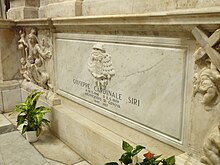Giuseppe Siri
Giuseppe Cardinal Siri (born May 20, 1906 in Genoa , Italy ; † May 2, 1989 ibid) was Archbishop of Genoa and Cardinal . As an influential theologian and church politician he was "for decades the spokesman for the conservative wing of the church".
Life
Giuseppe Siri was born in Genoa on May 20, 1906, to Nicolò and Giulia Siri. After his school education in Genoa, he studied Catholic theology at the Pontifical Gregorian University in Rome . On September 22, 1928 he received the sacrament of ordination through Cardinal Carlo Minoretti and then continued his studies in Rome until 1929.
On March 14, 1944, Pope Pius XII appointed him . as titular bishop of Livias and auxiliary bishop in the Archdiocese of Genoa. The episcopal ordination donated him Pietro Cardinal Boetto SJ on May 7, 1944. On May 14, 1946 Pius XII appointed him. to the successor to Boetto as Archbishop of Genoa. On January 12, 1953, Pius XII took him. in his second and last consistory as a cardinal priest with the titular church Santa Maria della Vittoria in the college of cardinals .
He was one of the central figures of the Second Vatican Council and represented a conservative position in the Coetus Internationalis Patrum together with the Cardinals Alfredo Ottaviani and Ernesto Ruffini .
It is certain that Siri was considered the favorite by the Conservatives in both the first and second conclaves of 1978 , but was defeated by Albino Luciani in the elections and then defeated by Karol Wojtyła a month later .
He left his examination of the “theological movement of our time” in his book “Gethsemani” (Italian 1980, German 1982), which was also published in German. In it he attacked the theologians Henri de Lubac , Karl Rahner and Jacques Maritain , accused them of falsifying history and opposing a “historicist mindset” and “absolute existential relativism” based on “Kantian fraud”, against “radical falsification of the Revelation ”and“ pluralistic dissolution ”of belief in the incarnation .
Until he reached his 80th birthday in 1986, he was the last cardinal entitled to vote, the Pope Pius XII. had appointed.
Giuseppe Siri died on May 2, 1989 in Villa Campostano in Albaro , a district of Genoa, and is buried in the Cathedral of San Lorenzo in Genoa.
Nazi escape aid
In 2002, the Argentine journalist Uki Goñi published information about the archbishop's activities in the Nazi escape aid, the so-called rat line . Siri supported the Pontifical Auxiliary Commission Pontificia Commissione di Assistenza (PCA) and founded the "National Committee for Emigration to Argentina" and the aid organization "Auxilium", which was headed by Monsignor Carlo Petranovic . According to US intelligence reports from 1947, according to Uki Goñi, “the archbishop was head of an international organization whose aim is to organize the emigration of anti-communist Europeans to South America. ... This general classification of "anti-communists" includes all persons who are political opponents of the communists, including fascists , Ustashe and similar groups. "
Honors
- 1963: Grand Cross of the Order of Merit of the Italian Republic
Web links
- Entry on Giuseppe Siri on catholic-hierarchy.org
- Siri, Giuseppe. In: Salvador Miranda : The Cardinals of the Holy Roman Church. ( Florida International University website), accessed July 15, 2016.
Individual evidence
- ↑ The Pope wants patient bishops. Wiener Zeitung , March 10, 2014
- ^ Uki Goñi: Odessa. The true story. Escape aid for Nazi war criminals. Berlin / Hamburg 2006 p. 227. Goñi quote: ibid. Goñi's quote from the US secret service: highlighted in italics .
- ↑ The translator Goñis Theo Bruns provides an overview. Theo Bruns: The Vatican and the Rat Line. How the Catholic Church smuggled Nazis and war criminals into South America [1]
| predecessor | Office | successor |
|---|---|---|
| Carlos Carmelo de Vasconcelos Motta |
Cardinal Protopriest 1982-1989 |
Paul-Émile Léger PSS |
| Maurilio Cardinal Fossati |
Chairman of the Italian Bishops' Conference 1959–1965 |
Giovanni Cardinal Urbani |
| Pietro Cardinal Boetto SJ |
Archbishop of Genoa 1946–1987 |
Giovanni Cardinal Canestri |
| personal data | |
|---|---|
| SURNAME | Siri, Giuseppe |
| ALTERNATIVE NAMES | Siri, Giuseppe Cardinal |
| BRIEF DESCRIPTION | Italian cardinal |
| DATE OF BIRTH | May 20, 1906 |
| PLACE OF BIRTH | Genoa , Italy |
| DATE OF DEATH | May 2, 1989 |
| Place of death | Albaro , Italy |


